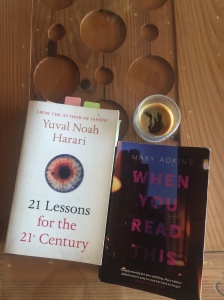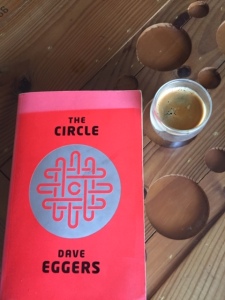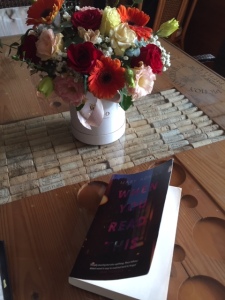Time seems to be accelerating and I simply cannot have enough time for reading fictions. I wish more people would care to read fictions, it is not just for pleasure, it gives us insights about humanity and living so we gain a better understanding about how we are connected and if you think about it we are not that different from each other. Reading fictions help to evoke empathy in us whether it is historical, literary, contemporary or science fictions. I am a compulsive reader thus I treasure my lone time so I can read and process what I am reading.
Yuval Noah Harari wrote in Chapter 18 of his third book, 21 Lessons for the 21st Century this:

‘Humans control the world because they can cooperate better with any other animal, and they can cooperate so well because they believe in fictions. Poets, painters and playwrights are therefore at least as important as soldiers and engineers. People go to war and build cathedrals because they believe in God, and they believe in God because they have read poems about God, because they have seen pictures of God, and because they have been mesmerised by theatrical plays about God. Similarly, our belief in the modern mythology of capitalism is underpinned by the artistic creations of Hollywood and the pop industry. We believe that buying more stuff will make us happy, because we saw the capitalist paradise with our own eyes on television. ‘

The author of Sapiens is of the view that science fiction is the most important artistic genre in the early twenty-first century. I think I agree with that. The Circle, a dystopian novel written by Dave Eggers and creators of Black Mirror television series try to forewarn us about the dark side of technology if we are not careful. The Stepford Wives was published in 1972. It tells the cautionary tale of how the men in the idyllic town of Stepford have wives who are immaculately beautiful, keep their homes in perfect order and generate home baked food for the family. Harari writes that movies like Ex Machina is not about the human fear of intelligent robots , it is more about the male fear of intelligent women, otherwise why on earth would an AI have a gender identity?
Amongst my many reads , I am presently reading Breakfast of Champions by Kurt Vonnegut, I find that the narratives describing us humans are hilarious and quite spot on. It is a reminder that humans tend to defy the laws of nature. That is probably why we are where we are today.

Written in 1973, set in the fictional town of Midland City in Ohio. There are two main characters, Dwayne Hoover is a Pontiac car dealer and he is wealthy resident in the city. Kilgore Trout is a widely published but unknown science fiction writer.
In the story, Dwayne Hoover is going insane and his ‘incipient insanity was mainly a matter of chemicals, of course. Dwayne Hoover’s body was manufacturing certain chemicals which unbalanced his mind. But Dwayne, like all novice lunatics, needed some bad ideas, too, so that his craziness could have shape and direction.’ He meets Trout who gives him the bad idea.
‘ Trout considered himself not only harmless but invisible. The world had paid so little attention to him that he supposed he was dead. But he learned from his encounter with Dwayne that he was alive enough to give a fellow human being ideas which would turn him into a monster.’
So it is apparent that Trout can bring evil into the world. Things that Trout says innocently or comments turns out to be the first germ in an epidemic of mind-poisoning. He therefore is inadvertently poisoning the collective mind of New York city.
The author writes this and it resonates with me :

‘ People took such awful chances with chemicals and their bodies because they wanted the quality of their lives to improve.’
Kurt Vonnegut studied biochemistry at Cornell University. During the second world war, he had served in Europe and his classic novel Slaughterhouse- Five was inspired by his experience witnessing the destruction of Dresden by Allied bombers, as a prisoner of war in Germany. Breakfast of Champions is not an easy read as the author weaves science fiction , memoir , parable, fairy tale and farce. There are also illustrations by drawings. The story is about media, free will, suicide and race issues. The book is a commendable read.

A few weeks ago I read another contemporary novel that has been written in unorthodox style. When You Read This , the debut novel by Mary Adkins is told through its characters via their emails, blog posts ( some with illustrated diagrams), text messages, and online therapy posts. When Iris Massey finds out that she has six months to live, she starts a blog and takes to writing and drawing to process it. She has unrealized dreams of opening a bakery. Her sister, Jade finds it hard to accept that her younger sister is gone at age thirty-three and she questions the doctor who treated Iris with a view to find fault with him. She wants to know why Iris did not go with the better chemo. She is a successful chef and she had always thought they had more time, for everything. After Iris dies, Smith, her boss from Simonyl Brand Management still continues to write to her. He cannot stop emailing Iris just like he can’t stop gambling. After Iris passed on, Smith could not find himself getting a replacement for Iris’s role as his assistant. Four months on, his good friend, Richie convinces him to take on Carl, aged 21 years, to be his intern. Carl Van Snyder can’t shut up and has a tendency to overstep his role. Carl is hilarious. While cleaning out Iris’s drawer, he stumbles on what appears to be a print-out of Iris’s blog, He tells Simon about it via email and then he inadvertently takes the print-out to lunch and then knocks over his Arnold Palmer spilling it over the post-it note that is kind of still legible. It reads:
‘ Smith ,
If you think this is any good, feel free to publish it. No pressure just because I’m dead.
Iris‘
The epistolary style draws you into the respective minds of the characters. It is a touching bittersweet story in a contemporary setting. Thought provoking and funny at the same time. Happy to have read it.


